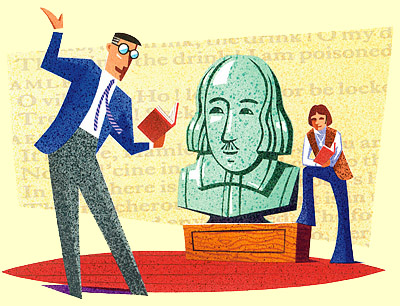The Bard Out Loud
Under Berkelman, he learned a better way to love Shakespeare
By Nicholas A. Basbanes ’65
One of my lingering regrets from childhood is the loss long ago of my first library card, a passkey to wonder acquired when I was a boy growing up in Lowell, Mass., and worn to tatters by the time I was 10.
Books have always mattered to me, but up until my junior year at Bates, when I took a two-semester course devoted entirely to the works of William Shakespeare, I was an English major, no more, no less, choosing that line of study because I loved to read and because I had always wanted to be a writer.

The great bard’s 38 plays, 154 sonnets, and assorted narrative poems came to us in that class by way of a stout one-volume edition from Scribner’s with excellent introductions by Thomas Marc Parrott. The realization that this weighty book might actually have an impact on my life did not arrive as a sudden epiphany, especially since I had read a good number of the works beforehand, and had a pretty good idea of what they were about. There was no eureka moment, in other words, when I said to myself, “I am a richer person because of this,” even though it became clear over time that this indeed was the case.
What happened, essentially, is that I fell under the spell of an extraordinary teacher by the name of Robert Berkelman, an English professor with a legendary reputation for crankiness, but one whose passion for Shakespeare was infectiously palpable and whose knowledge of the canon was formidable. Professor Berkelman was eager to share, but he demanded your best in return. (He once opened a class with this challenge: “Keats did it before he was 24. Could you?”)
A principle that Berkelman instilled in his students was a revelation to me: that you could read the same text repeatedly over time, and that something fresh and new would declare itself with each reading. Not only did I learn to engage a text critically under his tutelage, I learned to savor the beauty of the written word in ways previously unimaginable to me, and to appreciate the power it has to transform lives. It is no exaggeration to report that I was totally dazzled by the imagery, the poetry, and the insights Shakespeare offered into the frailties of human nature. I can honestly say I entered adulthood during the turbulent 1960s with William Shakespeare by my side as guide, seer, and companion, and that he has been with me ever since.
Something else Professor Berkelman preached in all his courses — and I took eight with him over four years, quite possibly a Bates record — was the merit of reading favorite passages aloud, a practice I use to this day, most productively with my own writing. When my daughters were children in the 1980s, it became customary for us to read their literary assignments together at night, and to discuss what we had just learned as we went along. Shakespeare’s plays were by far the most fun for us. We selected our roles, assumed what we thought were appropriate voices, and visualized the scenes as if we were directors staging our own productions. We tinkered with the blank verse, examined the language, shared our perceptions. Most of all, we allowed reading to enter our lives, and to work its magic.
Author Nick Basbanes’ most recent book is Every Book Its Reader: The Power of the Printed Word to Stir the World (HarperCollins, 2005). He is working on a centennial history of Yale University Press and a narrative history of paper and papermaking for Alfred A. Knopf. This essay appears in The Book That Changed My Life: 71 Remarkable Writers Celebrate the Books That Matter Most to Them (Gotham, 2006).